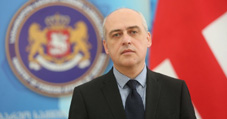
Woman dies in occupied Tskhinvali
By Natalia Kochiashvili
Thursday, October 31
EU Ambassador to Georgia H.E. Mr. Carl Hartzell says that the death of 70-year-old Margo Martiashvili, who suffered a stroke in the Russian-occupied Akhalgori district and was unable to be transported to the Tbilisi-administered territory because of the closed “checkpoints” with Tskhinvali, is “tragic, and we are doing our best for the crossing points to be reopened.”
The European Union Monitoring Mission (EUMM), which is the only international mission observing the situation at the occupation lines, has stated that “such tragic instances show the potential impact of the severe restrictions in place on the freedom of movement for the local population in Akhalgori.”
Nugzar Tinikashvili, Akhalgori district governor, says that the 70-year-old woman was unable to receive proper medical care in Tskhinvali due to the closure of the so-called checkpoint in the direction of Akhalgori and died. According to him, Margarita Martiashvili, who lived four kilometers away from the village of Ikoti, in Akhalgori, became ill a few days ago. She was taken to Akhalgori Hospital. “Naturally there is no condition for qualified medical care. Despite the request, they still refused to transfer her, instead took her to Tskhinvali and she passed away there,” said Tinikashvili.
It took more than two hours to transport a patient from the Russian-occupied Akhalgori district to Tskhinvali hospital, making it impossible to save a woman who had suffered a stroke. Martiashvili died in Tskhinvali hospital on October 28 as her relatives were unable to transport her to the Tbilisi-controlled territory via the shortest, so-called Razdakhani crossing point, due to its closure.
De facto Tskhinvali government says that they will reopen the crossing points as soon as Tbilisi removes the police post from the village of Chorchana, Khashuri municipality, which is located on the Tbilisi-controlled territory.
After the Russia-Georgia 2008 War, with the help from the Red Cross patients from the Russian-occupied region have been transported to Tbilisi-controlled territory via the Razdakhani crossing point.
However, because of the closure of the so-called border since September 2019, it has been impossible to use the route for medical purposes, and people living in Akhalgori are forced to wait for emergency brigades from Tskhinvali, which take longer than an hour to arrive.
The European Union Monitoring Mission (EUMM) offers its sincere condolences for the “unfortunate death” of Martiashvili.
“The EUMM-managed Hotline was not activated in this case. Our thoughts are with her family,” announced EUMM.
The mission noted that “such tragic instances show the potential impact of the severe restrictions in place on the freedom of movement for the local population in Akhalgori valley”.
According to EUMM, the main crossing point to South Ossetia and the Akhalgori Valley, which had 400 crossings daily "has been closed" since September 5, which is depriving local communities of prompt and adequate medical care.
To prevent further hardship, the mission announced that “it is important that restrictions are lifted as soon as possible and for a humanitarian approach to prevail in handling individual cases.”
The EUMM also noted that it “has made its position clear” on these points at recent Incident Prevention and Response Mechanism meetings in Ergneti.
Minister of foreign affairs of Georgia, Davit Zalkaliani stressed out that it is very important that the humanitarian situation of the people living near the occupation line be alleviated.
“This is really unacceptable, condemnable, and we are actively working with the international community. Also, it is important to alleviate the humanitarian situation in the areas adjacent to the occupation line and the population living there, and all institutions, including the State Minister's Institution, relevant ministries, are taking active steps to provide them with appropriate humanitarian assistance,” said the minister.
According to Zalkaliani, Georgia is also constantly raising the issue with the relevant UN institutions.
“These are institutions such as the UN Development Program, the UN International Center for Human Rights, as well as the UNHCR, the UN Commissioner for Human Rights. Before them, this issue is constantly updated to use all the tools at their disposal to alleviate the situation. This has been one of the major challenges we have been focusing on for the past 2 months. Not only are we watching, but we are also taking active steps,” commented Zalkaliani.
As he explained, these steps are reflected in the consolidation of the international community.
"We are in constant contact with the Geneva Co-Chairs. Also, I had a meeting with the UN Deputy Secretary-General, with whom I discussed these very topics. It is necessary, the topic of Georgia with the Russian Federation to be present in their political agenda and attention to be drawn to the difficulty of free movement on the occupied territories. This is a humanitarian catastrophe. Putting aside all political contexts, it is unacceptable when people wake up in barbed-wire environments and are unable to move freely,” announced the foreign minister.
He also stressed the importance of international involvement: ”It is very important that the international community, all the actors involved in the Geneva format, co-chairmen, the EU, the OSCE, the UN and the United States, which is our main strategic partner, place special emphasis on this and put this issue on the agenda of their bilateral relations with the Russian Federation,” said Zalkaliani.


